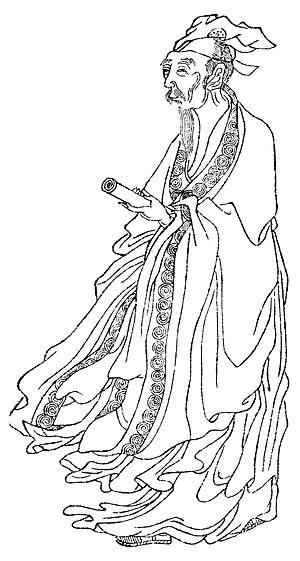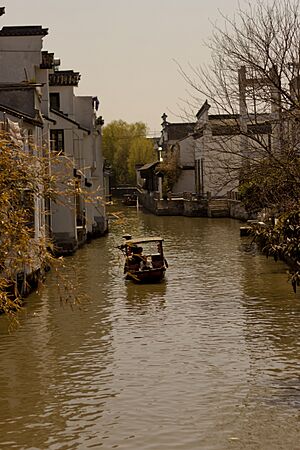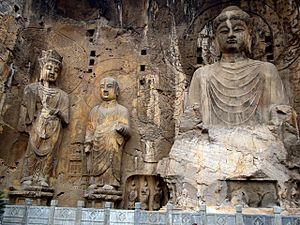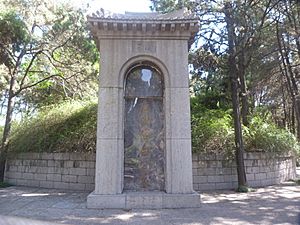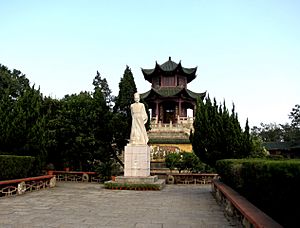Bai Juyi facts for kids
Quick facts for kids
Bai Juyi
|
|||||||||||||||||||||||||||
|---|---|---|---|---|---|---|---|---|---|---|---|---|---|---|---|---|---|---|---|---|---|---|---|---|---|---|---|
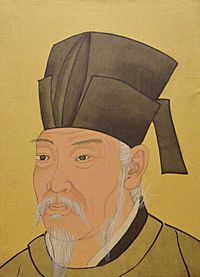
Portrait of Bai Juyi by Chen Hongshou
|
|||||||||||||||||||||||||||
| Born | 772 Taiyuan, Shanxi, China |
||||||||||||||||||||||||||
| Died | 846 (aged 73–74) Xiangshan Temple, Longmen (Luoyang), Henan, China |
||||||||||||||||||||||||||
| Occupation | Musician, poet, politician | ||||||||||||||||||||||||||
| Children | Bai Acui (son) | ||||||||||||||||||||||||||
| Relatives | Bai Huang (grandfather) Bai Jigeng |
||||||||||||||||||||||||||
| Chinese name | |||||||||||||||||||||||||||
| Chinese | 白居易 | ||||||||||||||||||||||||||
|
|||||||||||||||||||||||||||
| Letian | |||||||||||||||||||||||||||
| Traditional Chinese | 樂天 | ||||||||||||||||||||||||||
| Simplified Chinese | 乐天 | ||||||||||||||||||||||||||
|
|||||||||||||||||||||||||||
| Xiangshan Jushi | |||||||||||||||||||||||||||
| Chinese | 香山居士 | ||||||||||||||||||||||||||
| Literal meaning | Householder of Mount Xiang | ||||||||||||||||||||||||||
|
|||||||||||||||||||||||||||
| Korean name | |||||||||||||||||||||||||||
| Hangul | 백거이 | ||||||||||||||||||||||||||
| Hanja | 白居易 | ||||||||||||||||||||||||||
|
|||||||||||||||||||||||||||
| Japanese name | |||||||||||||||||||||||||||
| Kanji | 白居易 | ||||||||||||||||||||||||||
| Hiragana | はく きょい | ||||||||||||||||||||||||||
|
|||||||||||||||||||||||||||
Bai Juyi (772–846) was a famous Chinese poet, musician, and government official during the Tang dynasty. He was also known by his courtesy name, Letian. Many of his poems were about his life and what he saw around him every day. He became very well-known for writing poems in a simple, easy-to-understand style. This style was popular across East Asia during his time.
Bai Juyi also had a big impact on the history of Japanese literature. In Japan, he is often called Haku Rakuten. His younger brother, Bai Xingjian, was a short story writer. Some of Bai Juyi's most famous works are the long poems "Chang hen ge" ("Song of Everlasting Sorrow") and "Pipa xing" ("Song of the Pipa").
Life of Bai Juyi
Bai Juyi lived during the Middle Tang period (766-779). This was a time when the Tang Empire was rebuilding after a big war called the An Lushan Rebellion. Many famous poets like Li Bai and Du Fu lived before him. Bai Juyi had a long and successful career as both a government official and a poet. Sometimes, these two parts of his life caused problems for him. He was also a devoted Chan Buddhist.
Early Life and Education
Bai Juyi was born in 772 in Taiyuan, Shanxi, China. His family was not rich, but they loved learning. His father was a government official. When he was ten, Bai Juyi moved away from his family to avoid a war. He went to live with relatives in an area called Jiangnan.
Starting His Career
Bai Juyi's career as an official started well. He passed the difficult jinshi examinations in the year 800. These exams were how people got important jobs in the government. Around 801, he moved to the capital city, Chang'an. There, he became good friends with another scholar named Yuan Zhen.
In 804, Bai Juyi's father passed away. He spent three years in mourning, which was a tradition at the time. In 806, he got a small job as a government official near Chang'an. He later became a scholar in the Hanlin Academy in 807. He worked in the court until 815, except for another three-year mourning period when his mother died.
Time in Exile
In 814, Bai Juyi got into trouble at court. He made enemies because of his writings. He wrote about a long war he thought was unnecessary. He also wrote poems that criticized greedy officials and showed the struggles of common people.
Around this time, a powerful warlord named Wu Yuanji rebelled against the emperor. The Prime Minister, Wu Yuanheng, was assassinated. Bai Juyi spoke up to the emperor about this, even though it wasn't his place to do so. This was seen as breaking the rules.
His opponents also used two of his poems against him. His mother had died after falling into a well while looking at flowers. Bai Juyi had written poems called "In Praise of Flowers" and "The New Well." His enemies said these poems showed he didn't have enough filial piety, which is a key Confucian idea about respecting parents.
Because of this, Bai Juyi was sent away from the capital. He was sent to Jiujiang (then called Xun Yang) on the Yangtze River. After three years, he was sent even further away to a remote place in Sichuan. On his journey, he visited his friend Yuan Zhen, who was also in exile. Bai Juyi loved the beautiful flowers and trees in his new home. In 819, he was called back to the capital.
Back in the Capital
In 819, Bai Juyi returned to the capital. He was given a new job as an Assistant Secretary. In 821, a new emperor, Muzong, took the throne. Emperor Muzong spent his time feasting and didn't focus on his duties. This led to problems, with regional leaders challenging the government and a lot of corruption. Bai Juyi wrote many letters to the emperor, trying to warn him.
Governor of Hangzhou
Bai Juyi was again sent away from the capital. This time, he went to the important city of Hangzhou. This city was at the end of the Grand Canal and was known for its beautiful West Lake. His friend Yuan Zhen was serving nearby, so they could sometimes meet.
As governor of Hangzhou, Bai Juyi saw that local farms needed water from West Lake. But the old dike had broken, and the lake was drying up, causing a severe drought for farmers. He ordered a stronger, taller dike to be built with a dam. This helped control the water flow, providing irrigation and improving life for the local people. Bai Juyi also loved West Lake's beauty. He ordered a causeway to be built so people could walk around the lake instead of needing a boat. A causeway in West Lake is still called Bai Causeway in his honor today.
Life in Luoyang
In 824, Bai Juyi's time as governor ended. He was given the title of Imperial Tutor, which meant more pay than actual work. He moved his family to Luoyang, which was known as the "eastern capital." Luoyang was a large city and a cultural center.
Governor of Suzhou
In 825, when he was 53, Bai Juyi became the Governor of Suzhou. Suzhou is located on the Yangtze River and near Lake Tai. For two years, he enjoyed feasts and picnics. But then he became ill and had to retire for a while.
Later Years and Retirement
After being governor in Hangzhou and Suzhou, Bai Juyi returned to the capital. He held various official jobs. Later, he became governor of Henan province, where Luoyang is located. His first son was born there but sadly died the next year. In 831, his good friend Yuan Zhen passed away. For the next thirteen years, Bai Juyi held mostly honorary titles and lived in retirement.
In 832, Bai Juyi fixed up an old part of the Xiangshan Monastery near Longmen. He moved there and called himself the "Hermit of Xiangshan." This area is famous for its thousands of Buddha statues carved into the rock. In 839, he had a stroke that affected his left leg. He was bedridden for several months. After partly recovering, he spent his last years organizing his collected poems. He gave copies to the main monasteries in the places where he had lived.
Death
Bai Juyi died in 846. He asked for a simple burial at the monastery, with a plain funeral. He did not want a special title given to him after his death. His tomb is in Longmen, on Xiangshan, across the Yi River from the Longmen cave temples near Luoyang, Henan. It is a circular mound of earth about 4 meters (13 feet) high.
Bai Juyi's Works
Bai Juyi is known for his simple, direct, and easy-to-understand poems. He also used his poetry to comment on society and politics. Besides his poems, some of his letters and essays still exist today. He collected his writings in a book called the Bai Zhi Wen Ji.
Poetry Style and Popularity
Bai Juyi was one of the most productive Tang poets, writing over 2,800 poems. He made sure his poems were copied and shared so they would survive. He was famous for making his poems easy to understand. It is said that he would rewrite parts of a poem if his servants couldn't understand it. This made his poems very popular during his lifetime, both in China and Japan. People still read them today.
Famous Poems and Themes
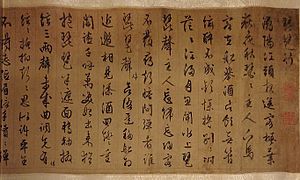
One of Bai Juyi's most famous poems is "The Song of the Pipa Player." Like the poet Du Fu, Bai Juyi felt a strong sense of social responsibility. He is well-known for his poems that made fun of bad behavior, like The Elderly Charcoal Seller. He also wrote about wars during the Tang Dynasty. Poems like "Song of Everlasting Sorrow" showed the dangers in China during the An Lushan rebellion.
Bai Juyi also wrote romantic poems to friends he studied and traveled with. One friend, Yu Shunzhi, sent Bai a piece of cloth as a gift. Bai Juyi wrote about how he debated what to do with the special gift:
About to cut it to make a mattress,
pitying the breaking of the leaves;
about to cut it to make a bag,
pitying the dividing of the flowers.
It is better to sew it,
making a coverlet of joined delight;
I think of you as if I'm with you,
day or night.
Bai Juyi's works were also highly respected in Japan. Many of his poems were mentioned in The Tale of Genji by Murasaki Shikibu.
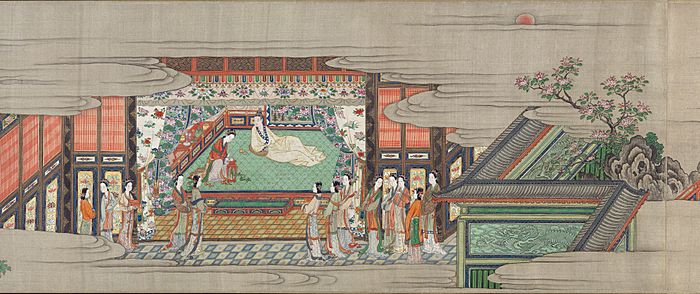
Japanese painting by Kanō Sansetsu (1590-1651).
Poetic Forms Used
Bai Juyi was interested in an old type of poetry called yuefu. These were like folk songs or ballads, often used to protest social problems. Bai Juyi believed that poetry should help improve society. He also wrote many well-structured poems in the regulated verse style.
Views on Art and Music
Bai Juyi lived after the An Lushan Rebellion, when the Tang Empire was recovering. As an official and writer, he noticed that court music was changing. It was being heavily influenced by music from the Western Regions (areas west of China). He wrote articles criticizing this. Bai Juyi believed that literature should have a clear moral lesson and a social purpose. He was not happy with the new styles of music at the Tang court.
For example, in his poem Faqu ge (Model Music), he wrote: "All the faqu's now are combined with songs from the barbarians; but the barbarian music sounds evil and disordered whereas Han music sounds harmonious!" This shows he preferred traditional Chinese music.
Court music performances in the Tang Dynasty had two main types: seated performances and standing performances. Seated performances were smaller and focused on refined art. Standing performances involved many dancers and were for grand shows.
In another poem, Libuji (Standing Section Players), Bai Juyi pointed out that both types of performances were full of foreign music. He felt that the traditional "elegant music" (Yayue) was no longer being played by the main performers. This poem shows how culture was changing in the Middle Tang Dynasty and how traditional music was declining.
Bai Juyi was worried that the popularity of foreign music could lead to chaos in Tang society. In his poems, the pipa (a Chinese lute) often showed feelings of love, communication, and the poet's emotions when listening to music.
How Bai Juyi is Remembered
Bai Juyi is seen as one of China's greatest poets. However, even during his time, people had different opinions about his poetry. Some poets praised him highly, while others criticized him. His poems were very popular because they were easy to understand and sometimes focused on everyday life. But this popularity also led some to call his work "common."
Some also criticized Bai Juyi for being "careless and repetitive," especially in his later works. Still, another Tang poet, Zhang Wei, placed Bai Juyi at the top of his list of important poets, calling his work "extensive and grand civilizing power."
Modern Views
Today, many experts agree that Bai Juyi worked hard to create a simple and clear style. This effort has made him one of the most loved and widely read Chinese poets, both in China and in other Asian countries. Thanks to translations by people like Arthur Waley, his poems are also very accessible to English readers.
See also
 In Spanish: Bai Juyi para niños
In Spanish: Bai Juyi para niños
- Li Shidao
- List of emperors of the Tang Dynasty
- Salt in Chinese history#The moral debate over salt and society
- West Lake


